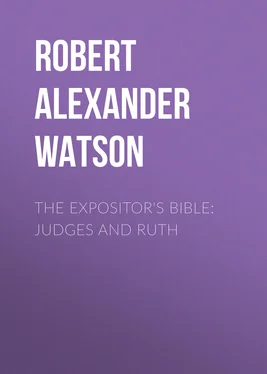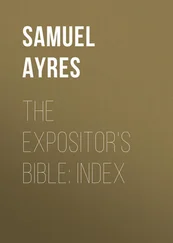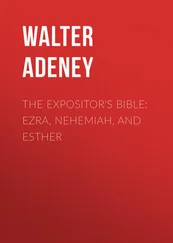Robert Alexander Watson - The Expositor's Bible - Judges and Ruth
Здесь есть возможность читать онлайн «Robert Alexander Watson - The Expositor's Bible - Judges and Ruth» — ознакомительный отрывок электронной книги совершенно бесплатно, а после прочтения отрывка купить полную версию. В некоторых случаях можно слушать аудио, скачать через торрент в формате fb2 и присутствует краткое содержание. Издательство: Иностранный паблик, Жанр: foreign_prose, foreign_religion, Философия, foreign_psychology, foreign_antique, на английском языке. Описание произведения, (предисловие) а так же отзывы посетителей доступны на портале библиотеки ЛибКат.
- Название:The Expositor's Bible: Judges and Ruth
- Автор:
- Издательство:Иностранный паблик
- Жанр:
- Год:неизвестен
- ISBN:нет данных
- Рейтинг книги:5 / 5. Голосов: 1
-
Избранное:Добавить в избранное
- Отзывы:
-
Ваша оценка:
- 100
- 1
- 2
- 3
- 4
- 5
The Expositor's Bible: Judges and Ruth: краткое содержание, описание и аннотация
Предлагаем к чтению аннотацию, описание, краткое содержание или предисловие (зависит от того, что написал сам автор книги «The Expositor's Bible: Judges and Ruth»). Если вы не нашли необходимую информацию о книге — напишите в комментариях, мы постараемся отыскать её.
The Expositor's Bible: Judges and Ruth — читать онлайн ознакомительный отрывок
Ниже представлен текст книги, разбитый по страницам. Система сохранения места последней прочитанной страницы, позволяет с удобством читать онлайн бесплатно книгу «The Expositor's Bible: Judges and Ruth», без необходимости каждый раз заново искать на чём Вы остановились. Поставьте закладку, и сможете в любой момент перейти на страницу, на которой закончили чтение.
Интервал:
Закладка:
But the danger to Israel's fidelity came when there began to be intercourse with the people of Canaan, now sunk from the purer thought of early times. Everywhere in the land of the Hittites and Amorites, Hivites and Jebusites, there were altars and sacred trees, pillars and images used in idolatrous worship. The ark and the altar of Divine religion, established first at Gilgal near Jericho, afterwards at Bethel and then at Shiloh, could not be frequently visited, especially by those who settled towards the southern desert and in the far north. Yet the necessity for religious worship of some kind was constantly felt; and as afterwards the synagogues gave opportunity for devotional gatherings when the Temple could not be reached, so in the earlier time there came to be sacred observances on elevated places, a windy threshing-floor, or a hill-top already used for heathen sacrifice. Hence, on the one hand, there was the danger that worship might be entirely neglected, on the other hand the grave risk that the use of heathen occasions and meeting-places should lead to heathen ritual, and those who came together on the hill of Baal should forget Jehovah. It was the latter evil that grew; and while as yet only a few Hebrews easily led astray had approached with kid or lamb a pagan altar, the alarm was raised. At Bochim a Divine warning was uttered which found echo in the hearts of the people.
There appears to have been a great gathering of the tribes at some spot near Bethel. We see the elders and heads of families holding council of war and administration, the thoughts of all bent on conquest and family settlement. Religion, the purity of Jehovah's worship, are forgotten in the business of the hour. How shall the tribes best help each other in the struggle that is already proving more arduous than they expected? Dan is sorely pressed by the Amorites. The chiefs of the tribe are here telling their story of hardship among the mountains. The Asherites have failed in their attack upon the sea-board towns Accho and Achzib; in vain have they pressed towards Zidon. They are dwelling among the Canaanites and may soon be reduced to slavery. The reports from other tribes are more hopeful; but everywhere the people of the land are hard to overcome. Should Israel not remain content for a time, make the best of circumstances, cultivate friendly intercourse with the population it cannot dispossess? Such a policy often commends itself to those who would be thought prudent; it is apt to prove a fatal policy.
Suddenly a spiritual voice is heard, clear and intense, and all others are silent. From the sanctuary of God at Gilgal one comes whom the people have not expected; he comes with a message they cannot choose but hear. It is a prophet with the burden of reproof and warning. Jehovah's goodness, Jehovah's claim are declared with Divine ardour; with Divine severity the neglect of the covenant is condemned. Have the tribes of God begun to consort with the people of the land? Are they already dwelling content under the shadow of idolatrous groves, in sight of the symbols of Ashtoreth? Are they learning to swear by Baal and Melcarth and looking on while sacrifices are offered to these vile masters? Then they can no longer hope that Jehovah will give them the country to enjoy; the heathen shall remain as thorns in the side of Israel and their gods shall be a snare. It is a message of startling power. From the hopes of dominion and the plans of worldly gain the people pass to spiritual concern. They have offended their Lord; His countenance is turned from them. A feeling of guilt falls on the assembly. "It came to pass that the people lifted up their voice and wept."
This lamentation at Bochim is the second note of religious feeling and faith in the Book of Judges. The first is the consultation of the priests and the oracle referred to in the opening sentence of the book. Jehovah Who had led them through the wilderness was their King, and unless He went forth as the unseen Captain of the host no success could be looked for. "They asked of Jehovah, saying, Who shall go up for us first against the Canaanites, to fight against them?" In this appeal there was a measure of faith which is neither to be scorned nor suspected. The question indeed was not whether they should fight at all, but how they should fight so as to succeed, and their trust was in a God thought of as pledged to them, solely concerned for them. So far accordingly there is nothing exemplary in the circumstances. Yet we find a lesson for Christian nations. There are many in our modern parliaments who are quite ready to vote national prayer in war-time and thanksgiving for victories, who yet would never think, before undertaking a war, of consulting those best qualified to interpret the Divine will. The relation between religion and the state has this fatal hitch, that however Christian our governments profess to be, the Christian thinkers of the country are not consulted on moral questions, not even on a question so momentous as that of war. It is passion, pride, or diplomacy, never the wisdom of Christ, that leads nations in the critical moments of their history. Who then scorn, who suspect the early Hebrew belief? Those only who have no right; those who as they laugh at God and faith shut themselves from the knowledge by which alone his can be understood; and, again, those who in their own ignorance and pride unsheathe the sword without reference to Him in Whom they profess to believe. We admit none of these to criticise Israel and its faith.
At Bochim, where the second note of religious feeling is struck, a deeper and clearer note, we find the prophet listened to. He revives the sense of duty, he kindles a Divine sorrow in the hearts of the people. The national assembly is conscience-stricken. Let us allow this quick contrition to be the result, in part, of superstitious fear. Very rarely is spiritual concern quite pure. In general it is the consequences of transgression rather than the evil of it that press on the minds of men. Forebodings of trouble and calamity are more commonly causes of sorrow than the loss of fellowship with God; and if we know this to be the case with many who are convicted of sin under the preaching of the gospel, we cannot wonder to find the penitence of old Hebrew times mingled with superstition. Nevertheless, the people are aware of the broken covenant, burdened with a sense that they have lost the favour of their unseen Guide. There can be no doubt that the realization of sin and of justice turned against them is one cause of their tears.
Here, again, if there is a difference between Israel and Christian nations, it is not in favour of the latter. Are modern senates ever overcome by conviction of sin? Those who are in power seem to have no fear that they may do wrong. Glorifying their blunders and forgetting their errors, they find no occasion for self-reproach, no need to sit in sackcloth and ashes. Now and then, indeed, a day of fasting and humiliation is ordered and observed in state; the sincere Christian for his part feeling how miserably formal it is, how far from the spontaneous expression of abasement and remorse. God is called upon to help a people who have not considered their ways, who design no amendment, who have not even suspected that the Divine blessing may come in still further humbling. And turning to private life, is there not as much of self-justification, as little of real humility and faith? The shallow nature of popular Christianity is seen here, that so few can read in disappointment and privation anything but disaster, or submit without disgust and rebellion to take a lower place at the table of Providence. Our weeping is so often for what we longed to gain or wished to keep in the earthly and temporal region, so seldom for what we have lost or should fear to lose in the spiritual. We grieve when we should rather rejoice that God has made us feel our need of Him, and called us again to our true blessedness.
Читать дальшеИнтервал:
Закладка:
Похожие книги на «The Expositor's Bible: Judges and Ruth»
Представляем Вашему вниманию похожие книги на «The Expositor's Bible: Judges and Ruth» списком для выбора. Мы отобрали схожую по названию и смыслу литературу в надежде предоставить читателям больше вариантов отыскать новые, интересные, ещё непрочитанные произведения.
Обсуждение, отзывы о книге «The Expositor's Bible: Judges and Ruth» и просто собственные мнения читателей. Оставьте ваши комментарии, напишите, что Вы думаете о произведении, его смысле или главных героях. Укажите что конкретно понравилось, а что нет, и почему Вы так считаете.












